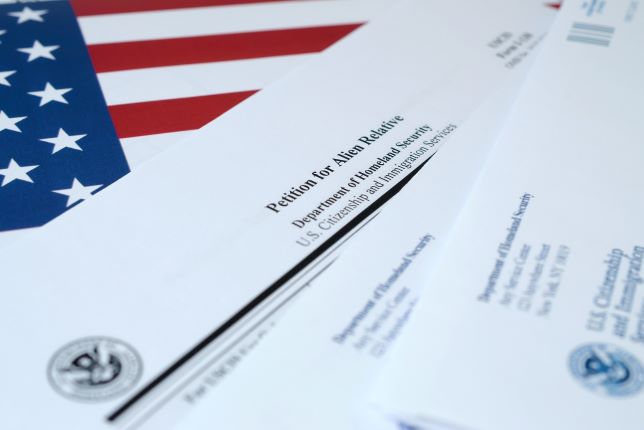Who can be the petitioner on the Form I-130?

If you typed: Who can be the petitioner on the Form I-130? And are looking for an objective answer keep reading this article to discover all you need to know about this subject!
The petitioner on Form I-130, Petition for Alien Relative, must be a U.S. citizen or a lawful permanent resident (Green Card holder). The petitioner is the individual who is seeking to sponsor a relative for immigration to the United States.
The relative being sponsored must be a spouse, parent, sibling, or unmarried child under the age of 21, and must not be a U.S. citizen. The petitioner is responsible for providing evidence of the relationship and financial support for the relative being sponsored.
What is USCIS Form I-130 (Petition for Alien Relative)?
Annually, U.S. citizens and lawful permanent residents initiate the Green Card process for their overseas family members by filing Form I-130 with the U.S. Citizenship and Immigration Services (USCIS).
This document, also known as the Petition for Alien Relative, serves as the initial step in many family-based Green Card applications. Through this form, USCIS evaluates the authenticity and eligibility of the relationship between the Green Card sponsor and the foreign national seeking a Green Card.
Who can be the petitioner on the Form I-130?
U.S. citizens and permanent residents who aim to secure permanent residency for their close family members can initiate the process by submitting Form I-130. However, only immediate relatives such as spouses, parents, and children can be sponsored. It is important to note that for each individual family member, a separate Form I-130 petition must be filed.
Who Can’t be the petitioner on the Form I-130?
Form I-130 can only be filed by U.S. citizens or permanent residents. Additionally, not all family members may be eligible for sponsorship, even if the petitioner is an American citizen or permanent resident. The following family members cannot be sponsored:
- Family members who have engaged in visa fraud by marrying or attempting to marry solely for immigration benefits;
- Biological parents in cases where the petitioner’s U.S. immigration status was obtained through adoption;
- Adoptive parents or children who were adopted after turning 16 years old;
- Married children if the petitioner is a permanent resident (green card holders can only sponsor their unmarried children);
- Grandparents, grandchildren, nephews, nieces, aunts, uncles, cousins, or parents-in-law;
- Stepparents or stepchildren who became part of the family after the petitioner turned 18 years old;
- A spouse who did not attend the marriage ceremony in person with the petitioner;
- A spouse who received a green card through a previous marriage and has not been a permanent resident for at least five years or has not become a U.S. citizen through naturalization;
- A spouse who was married to the petitioner while they were in immigration court proceedings;
When filing Form, I-130, supporting documents must be submitted to confirm that the relative being sponsored does not fall under any of the above disqualifying categories.
What documents are needed for I-130?
When submitting your Form I-130, it’s important to ensure that the supporting documents meet two key objectives. Firstly, they must demonstrate that you are either a valid U.S. permanent resident or a U.S. citizen.
Secondly, they must verify the authenticity of the family relationship between you and the person for whom you are sponsoring a green card. If the supporting documents are in a foreign language, you must include a full English translation.
Typically, the following items should be included with Form I-130:
- Evidence of your U.S. citizenship or permanent residency, such as your naturalization certificate, birth certificate, green card, or U.S. passport;
- Documentation that confirms the validity of your relationships with the foreign family member, such as a marriage certificate or birth certificate;
- Records of any name change for either you or the foreign family member, for example, an affidavit;
- Passport-sized photos of both you and the foreign family member, taken within the last six months;
- Payment of the Form I-130 filing fee;
Please note that the required supporting documents may vary based on your immigration background and the type of family member you are seeking permanent residency. For example, the documents required for an I-130 petition for your spouse will differ from those needed for your parents.
Don’t let your immigration worries hold you back any longer!
Contact us today to learn about our comprehensive immigration solutions packages and how we can help make your dreams of living in the United States a reality.
With our expert team, you can trust that your case will be handled with the utmost care and attention to detail.
Let us help you navigate the complex immigration process and answer any questions you may have. Contact us now and take the first step towards a brighter future!
Pay Attention: 7 Common Mistakes to Avoid in the Immigration Process
The immigration process can be complex and time-consuming and making mistakes can have serious consequences. To help our clients we prepare blog posts every week to outline some of the most common mistakes that you can make during the immigration process and offer practical advice on how to avoid them.
The most common mistakes are:
1. Not properly gathering and organizing all required documents;
2. Failing to disclose relevant information to USCIS;
3. Missing deadlines or submitting applications with errors;
4. Failing to understand the specific requirements for different visa categories;
5. Not properly preparing for immigration interviews;
6. Not seeking professional help when needed;
7. Failing to stay up to date with changing immigration laws and policies;
For this reason, the goal of this blog post is to educate readers on the importance of avoiding these mistakes and to help them navigate the immigration process as smoothly and successfully as possible.
